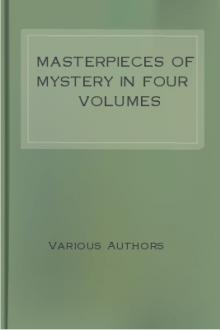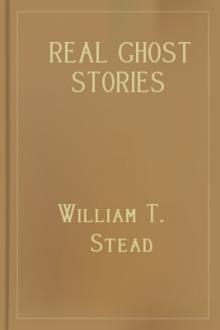Varney the Vampire; Or, the Feast of Blood by Prest and Rymer (ereader iphone .txt) 📗

- Author: Prest and Rymer
Book online «Varney the Vampire; Or, the Feast of Blood by Prest and Rymer (ereader iphone .txt) 📗». Author Prest and Rymer
With that he gave himself a shrug, as if some very uncomfortable feeling had come over him.
"I'll go to bed early, and get some sleep, and then in daylight I can look after these papers. They won't be less interesting in the morning than they are now."
There had been some rum stories about the old man, and now the nephew seemed to think he might have let the family sleep on the premises for that night; yes, at that moment he could have found it in his heart to have paid for all the expense of their keep, had it been possible to have had them back to remain the night.
But that wasn't possible, for they would not have done it, but sooner have remained in the streets all night than stay there all night, like so many house-dogs, employed by one who stepped in between them and their father's goods, which were their inheritance, but for one trifling circumstance—a mere ceremony.
The night came on, and he had lights. True it was he had not been down stairs, only just to have a look. He could not tell what sort of a place it was; there were a good many odd sort of passages, that seemed to end nowhere, and others that did.
There were large doors; but they were all locked, and he had the keys; so he didn't mind, but secured all places that were not fastened.
He then went up stairs again, and sat down in the room where the bureau was placed.
"I'll be bound," said one of the guests, "he was in a bit of a stew, notwithstanding all his brag."
"Oh! I don't believe," said another, "that anything done that is dangerous, or supposed to be dangerous, by the bravest man, is any way wholly without some uncomfortable feelings. They may not be strong enough to prevent the thing proposed to be done from being done, but they give a disagreeable sensation to the skin."
"You have felt it, then?"
"Ha! ha! ha!"
"Why, at that time I slept in the churchyard for a wager, I must say I felt cold all over, as if my skin was walking about me in an uncomfortable manner."
"But you won your wager?"
"I did."
"And of course you slept there?"
"To be sure I did."
"And met with nothing?"
"Nothing, save a few bumps against the gravestones."
"Those were hard knocks, I should say."
"They were, I assure you; but I lay there, and slept there, and won my wager."
"Would you do it again?"
"No."
"And why not?"
"Because of the rheumatism."
"You caught that?"
"I did; I would give ten times my wager to get rid of them. I have them very badly."
"Come, order, order—the tale; let's hear the end of that, since it has begun."
"With all my heart. Come, neighbour."
"Well, as I said, he was fidgetty; but yet he was not a man to be very easily frightened or overcome, for he was stout and bold.
"When he shut himself up in the room, he took out a bottle of some good wine, and helped himself to drink; it was good old wine, and he soon felt himself warmed and, comforted. He could have faced the enemy.
"If one bottle produces such an effect," he muttered, "what will two do?"
This was a question that could only be solved by trying it, and this he proceeded to do.
But first he drew a brace of long barrelled pistols from his coat pocket, and taking a powder-flask and bullets from his pocket also, he loaded them very carefully.
"There," said he, "are my bull-dogs; and rare watch-dogs they are. They never bark but they bite. Now, if anybody does come, it will be all up with them. Tricks upon travellers ain't a safe game when I have these; and now for the other bottle."
He drew the other bottle, and thought, if anything, it was better than the first. He drank it rather quick, to be sure, and then he began to feel sleepy and tired.
"I think I shall go to bed," he said; "that is, if I can find my way there, for it does seem to me as if the door was travelling. Never mind, it will make a call here again presently, and then I'll get through."
So saying he arose. Taking the candle in his hand, he walked with a better step than might have been expected under the circumstance. True it was the candle wagged to and fro, and his shadow danced upon the wall; but still, when he got to the bed, he secured his door, put the light in a safe place, threw himself down, and was fast asleep in a few moments, or rather he fell into a doze instantaneously.
How long he remained in this state he knew not, but he was suddenly awakened by a loud bang, as though something heavy and flat had fallen upon the floor—such, for instance, as a door, or anything of that sort. He jumped up, rubbed his eyes, and could even then hear the reverberations through the house.
"What is that?" he muttered; "what is that?"
He listened, and thought he could hear something moving down stairs, and for a moment he was seized with an ague fit; but recollecting, I suppose, that there were some valuables down stairs that were worth fighting for, he carefully extinguished the light that still burned, and softly crept down stairs.
When he got down stairs he thought he could hear some one scramble up the kitchen stairs, and then into the room where the bureau was. Listening for a moment to ascertain if there were more than one, and then feeling convinced there was not, he followed into the parlour, when he heard the cabinet open by a key.
This was a new miracle, and one he could not understand; and then he heard the papers begin to rattle and rustle; so, drawing out one of the pistols, he cocked it, and walked in.
The figure instantly began to jump about; it was dressed in white—in grave-clothes. He was terribly nervous, and shook, so he feared to fire the pistol; but at length he did, and the report was followed by a fall and a loud groan.
This was very dreadful—very dreadful; but all was quiet, and he lit the candle again, and approached the body to examine it, and ascertain if he knew who it was. A groan came from it. The bureau was open, and the figure clutched firmly a will in his hand.
The figure was dressed in grave-clothes, and he started up when he saw the form and features of his own uncle, the man who was dead, who somehow or other had escaped his confinement, and found his way up, here. He held his will firmly; and the nephew was so horrified and stunned, that he threw down the light, and rushed out of the room with a shout of terror, and never returned again.
The narrator concluded, and one of the guests said,—
"And do you really believe it?"—"No, no—to be sure not."
"You don't?"—"Why should I? My friend was, out of all hand, one of the greatest liars I ever came near; and why, therefore, should I believe him? I don't, on my conscience, believe one word of it."
It was now half-past twelve, and, as Tom Eccles came not back, and the landlord did not feel disposed to draw any more liquor, they left the inn, and retired to their separate houses in a great state of anxiety to know the fate of their respective wagers.
CHAPTER LXIV. THE VAMPIRE IN THE MOONLIGHT.—THE FALSE FRIEND.Part of the distance being accomplished towards the old ruins, Tom Eccles began to feel that what he had undertaken was not altogether such child's-play as he had at first imagined it to be. Somehow or another, with a singular and uncomfortable sort of distinctness, there came across his mind every story that he had remembered of the wild and the wonderful. All the long-since forgotten tales of superstition that in early childhood he had learned, came now back upon him, suggesting to his mind a thousand uncomfortable fancies of the strangest description.
It was not likely that when once a man, under such circumstances, got into such a frame of mind, he would readily get out of it again, while he continued surrounded by such scenes as had first called them into existence.
No doubt, had he turned about, and faced the inn again instead of the old ruins he would soon have shaken off these "thick coming fancies;" but such a result was





Comments (0)